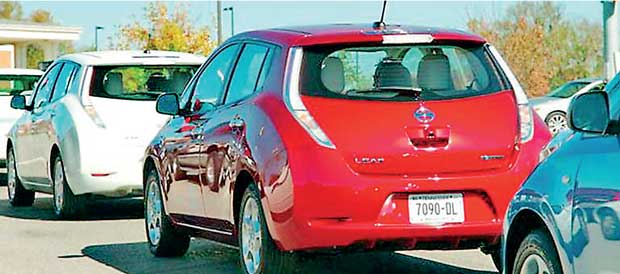15 Feb 2018 - {{hitsCtrl.values.hits}}

By Chandeepa Wettasinghe
Despite the Central Bank last week issuing directives to the banks and finance companies to significantly lift the restrictions on leasing on electric motor vehicles to align with the environmentalist spirit of the 2018 budget, the stakeholders were of the view that this would not lead to a boom in the electric vehicle market without further adjustments.
The maximum loan-to-value ratio (LTV) for electric commercial vehicles, cars, SUVs, vans, three-wheelers and any other electric vehicle are now 90 percent of market value, if the vehicles are unregistered or have only been in use in Sri Lanka for less than one year, after the
first registration.
The budget speech had only included this new LTV ratio for electric busses and three-wheelers, as well as domestically assembled three-wheelers, cars and buses. The Central Bank has not set such a restriction.
Further, the Central Bank has also introduced a 70 percent LTV ratio for hybrid cars, SUVs and vans, which too was not proposed in the budget.
For non-electric or hybrid vehicles, the older LTV ratios imposed in January 2017 still stand, with a 90 percent LTV for commercial vehicles, a 50 percent LTV for cars, SUVs and vans, a 25 percent LTV for three-wheelers and a 70 percent LTV for other vehicles.
Meanwhile, for registered vehicles, which have been used for more than one year after the first registration, a maximum LTV of 70 percent was maintained by the Central Bank.
“The limits will not be applicable to credit facilities granted to any company engaged in tourism and/or transportation for purchase of vehicle fleets to be utilized for their core business operations, provided that such vehicles financed will not be transferred to any person or entity within one year from the date of the first registration,” the Central Bank said.
For these exempted purposes, the banks and finance companies are required to place internal limits and risk management strategies, the Central Bank directed.
Financial Houses Association Immediate Past Chairman Ravi Yatawara noted that despite the LTV ratios being eased with regard to electric vehicles, there may not be an improvement in demand due to a lack of choice in the market.
“There are no other electric models in the market other than the Nissan Leaf, a Mercedes and a small BMW. So, the choice is not there, unlike the hybrids,” he said.
Meanwhile, Vehicle Importers’ Association of Lanka President Sampath Merenchige noted that unless the new duty structure for the electric vehicles introduced in the 2018 budget is tweaked, the demand won’t increase.
Although duties on electric vehicles were slashed in the budget, the biggest benefit was for smaller cars running on low-powered engines below 100kWs—which included the popular old Nissan Leaf, which claims over 95 percent of the local market—while most of the latest generation electric cars, including the new Leaf model, are running on engines over 100kWs.
The low duties are only applicable to brand-new and less than one-year-old electric vehicles.
“They should extend it to three years if they want to see results,” Merenchige said.
The 2018 budget sought to have only hybrid and electric vehicles operational in Sri Lanka by 2040.
However, the relaxation of the LTVs on hybrids would further nudge up the hybrid registrations in the coming two months, especially since there was a shortage of hybrids in the market, according to Yatawara.
“Over the last two to three weeks there was a shortage in the market. So, over the next month and a half to two, we will anyway definitely see an improvement,” he said.
19 Nov 2024 29 minute ago
19 Nov 2024 2 hours ago
19 Nov 2024 3 hours ago
19 Nov 2024 3 hours ago
19 Nov 2024 3 hours ago